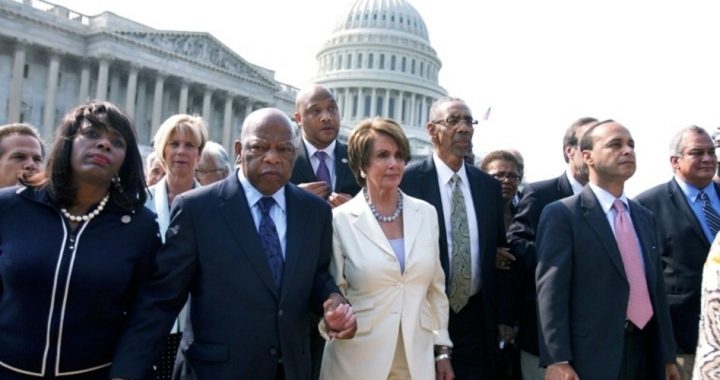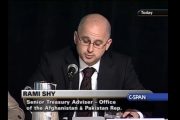
Late Thursday afternoon, the U.S. House of Representatives voted to hold Attorney General Eric Holder in contempt for failing to comply fully with the congressional investigation into the ATF’s gunwalking scandal “Operation Fast and Furious.” The vote was 255 to 67 with 17 Democrats breaking from their party to vote in favor of the contempt measure along with Republicans. A second resolution, the civil contempt charge that would authorize the House Oversight Committee to seek judgment in federal court requiring Holder to comply with subpoenas, passed by a vote of 258 to 95, with 21 Democrats voting with Republicans.
“It’s important to remember how we got here,” House Speaker John Boehner (R-Ohio) reminded his colleagues in a speech ahead of the vote. “The Justice Department has not provided the facts and information we requested.… It’s our constitutional duty to find out.”
Congress has been investigating the Fast and Furious operation for well over a year, and has grown infuriated with Holder’s refusal to adequately comply with the investigation. The New York Post explains,
Holder has provided 7,600 documents while the [House Government and Oversight] Committee has issued subpoenas asking for tens of thousands more over a botched federal program that resulted in guns getting into the hands of Mexican criminals.
Holder has defended his refusal to hand over documents for the congressional investigation by asserting that it would violate the “separation of powers.”
Congress did receive thousands of documents from the Department of Justice, many of which were irrelevant to the investigation, and others of which were redacted. As noted by The New American’s Alex Newman, the DOJ supplied less than 10 percent of the documents that were requested for the investigation.
Last week, President Obama invoked “executive privilege” over the documents, prompting some critics to question just how much the Obama administration knew about Fast and Furious. Nevertheless, Republicans forged ahead with the contempt vote. Ironically, during his presidential campaign, then-Senator Obama accused President George W. Bush of hiding behind executive privilege. Four years later, critics note that he is guilty of the same offense.
Democrats in the House found themselves in the uncomfortable position of having to decide whether to side with the White House and Eric Holder against the American people, or to stand up against their party. While some Democrats elected to stand against their party, others upheld a different set of priorities.
A number of Democrats, led by the Congressional Black Caucus, walked off the floor to show their opposition to the vote. In a copy the CBC members’ letter obtained by Politico, they state,
We adamantly oppose this partisan attack and refuse to participate in any vote that would tarnish the image of Congress or of an attorney general who has done nothing but work tirelessly to protect the rights of the American people. We must reflect upon why we are elected to this body and choose now to stand up for justice. We call upon all members of Congress to stand with us during a press conference on the Capitol Building steps during this appalling series of votes to discuss our nation’s most significant priority — creating jobs. At this critically important time in our nation, we must work as colleagues rather than political enemies.
Instead of focusing on job creation and other critical issues before this Congress, we have been asked to engage in a political stunt on the floor of the United States House of Representatives. Our constituents elected us to do real work, not to engage in meaningless partisan activity.
On Thursday morning, both Representatives Jim Clyburn (D-S.C.) and John Lewis (D-Ga.) gave impassioned speeches before their colleagues encouraging them to walk out with them in support of Holder. Clyburn said Democrats would stay just long enough to vote on the rules for the contempt vote before walking out.
“We asked for them to just think about what we’re doing and our obligation to this institution, and the fact that we ought not to participate,” Clyburn said.
Politico notes that the agenda behind the walkout appeared to be “a move designed to turn the fight between GOP leaders and the White House over the Fast and Furious probe into a political rally for minority voters.”
Democrats are seemingly following the example set by Republicans in 2008, when they walked out of the U.S. House of Representatives when Democrats were pushing a contempt resolution against the George W. Bush administration.
Attorney General Eric Holder released a statement calling the vote against him “a regrettable culmination of what became a misguided — and politically motivated — investigation during an election year. By advancing it over the past year and a half, Congressman [Darrell] Issa and others have focused on politics over public safety.”
Despite attempts by the Democrats to paint the investigation as a witch hunt, a Fox News poll showed that 38 percent of voters believe the White House to be “cover[ing] up” Fast and Furious, while 32 percent believe the entire ordeal to be a “witch hunt by congressional Republicans.” Twelve percent believe it to be both, and 18 percent had no opinion on it.
Additionally, of those polled, 43 percent believe the president’s use of executive privilege indicates the administration is “hiding something” while 42 percent believe the White House must have had a “legitimate reason” for using the privilege.
Other interesting items from the poll show that 54 percent believe Operation Fast and Furious was “a bad idea from the start,” while half indicate they are paying close attention to the investigation.
Thursday’s vote is the first ever full House contempt vote against an attorney general. Because such an event is unprecedented, what happens next remains an uncertainty. As noted by the Washington Post, “If the courts do end up deciding the case, however, they could shed some light on a foggy patch of constitutional law: What happens when Congress demands that a president turn over documents he says should be kept secret?”
The constitutional question becomes even more convoluted when one takes into consideration the president’s invoking of executive privilege. The last time the Supreme Court addressed a matter involving executive privilege was during the 1970s Watergate scandal.
Photo: From left, Rep. Terri Sewell, D-Ala., Rep. John Lewis, D-Ga., House Minority Leader Nancy Pelosi of Calif., Rep. Bobby Rush, D-Ill., Rep. Eliot Engel, D-N.Y., Rep. Luis Gutierrez, D-Ill., and other House Democrats leave Capitol Hill in Washington, Thursday, June 28, 2012, in protest of a House vote holding Attorney General Eric Holder in contempt of Congress: AP Images




